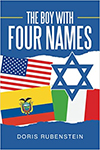Review — THE BOY WITH FOUR NAMES by Doris Rubenstein (Ecuador)
 The Boy with Four Names
The Boy with Four Names
(for adults and young adults)
Doris Rubenstein (Ecuador 1971-73)
IUniverse
June 2021
180 pages
$13.99 (paperback), $3.99 (Kindle)
Reviewed by John Chromy (India 1963–65); (PC CD/Eastern Caribbean (1977–79); (Assoc Dir-PC/Washington 1979–1981)
•

Doris Rubenstein
In Italy their baby son was named Enrico, and through the support of a network of Jewish people, the Cohen family were able to obtain a visa to enter Ecuador, one of the few western countries willing to take in Jewish immigrants despite the rapidly growing nightmare unfolding in Europe. Arriving on an hacienda in the Altiplano, young Enrico acquired his second name, Enrique, when his family was employed on the ranch and he began school.
The story follows his family’s move three years later to Quito where his father opened a small shop and Enrique entered public school, Escuela Espejo, where he thrived academically, but faced numerous social issues as a non-hispanic young boy.
Life in Quito was generally good, but here was a young Jewish boy who spoke only Spanish, knowing neither German nor Yiddish, he could not communicate with his family members in other countries. Nor was he much interested in being a practicing Jew, mostly he was interested in playing soccer.
As he neared the Bar Mitzvah age of 13, Enrique’s parents shipped him to relatives in Toledo, Ohio where he could be treated for a rare skin condition that needed a specialist’s care. In Ohio he became Henry as he learned English, began his Jewish studies and matured into a brilliant, mature young man.
Upon his return to Ecuador a year later, Enrico/ Enrique/Henry prepared and stood for his Bar Mitzvah during which he was given the Hebrew name Tzvi ben Avraham as he entered the world of adulthood and all its responsibilities.
Ms. Rubenstein provides many intriguing insights into this Jewish family and their community’s support network. The escape from nazi/fascist Europe is both frightening and heartwarming in its success. Enrique’s many social adventures in Ecuador are fun reads and his eventual success in becoming a pillar of the business community in Quito is a very satisfying ending.
All-in-all, a good read.
Our thanks should go out to Ms. Rubenstein for sharing this unique family story, and shining light on Ecuador’s generosity in accepting endangered immigrants in the 1930s when few other countries did so.
•
 The Boy with Four Names
The Boy with Four Names
(for adults and young adults)
Doris Rubenstein (Ecuador 1971-73)
IUniverse
June 2021
180 pages
$13.99 (paperback), $3.99 (Kindle)
•

John Chromy
Reviewer John Chromy was a Peace Corps Volunteer in India (1963–65), a PC Country Director in the Eastern Caribbean (1977–79), and Associate Director at Peace Corps/Washington (1979–1981) overseeing Volunteer Recruitment, Selection, Placement, Medical Services and Payroll. He spent several weeks in Afghanistan in 1976 and again in 2004.
He is now retired and living in Washington DC after a 40 year career in community-based development on both the domestic and international fronts.
Doris Rubenstein’s book is a great read for all the reasons given by John Chromy, and I agree that she deserves our gratitude for her dedication to record the story for us before it was lost. When Enrique Cohen arrived in Ecuador with his family, the country was a feudal society, as it had been for hundreds of years.
Only in the last quarter of the 20th century did Ecuador take strides to enter the modern world. For an overview of life in old Ecuador as encountered by Peace Corps Volunteers in the 1960s, the video “Ecuador, Me and the Peace Corps” can be seen on YouTube. It was made by PCV Preston Wilson, Ecuador 1968-70, who returned for the first time in 2012 to witness the dramatic change for himself.
Watching the pilots land their plane in the old airport of Quito in the treacherous Andes will thrill and frighten. Wilson includes his period photos of the gorgeous landscape and desperate life of the indigenous who struggled to survive in those mountains. His photos vividly illustrate how their labor was exploited for hundreds of years until they finally succeeded in claiming their civil rights, while retaining their culture.
Beverly Hammons, RPCV 1970-73 Ecuador
Hi Bev, Nothing like finding this stuff by googling your name on line. Thanks for your comments. I’m not sure that the reviewer represented the story very accurately, but as long as he likes the book, I’m GOOD! Didn’t know that Preston’s film is on YouTube. Will find it and share the url with the folks on Facebook. Abrazos, Doris
Thanks Beverly—I will watch Preston Wilson’s Video. we in the PC of the ’60’s livd through some “interesting times”
Thanks for the kind review, John. I didn’t see this in the hard copy version of the magazine for some reason! Got my fingers crossed that a major publisher will buy the copyright and give this book the distribution it needs for teens across the country to read it in school or at home.